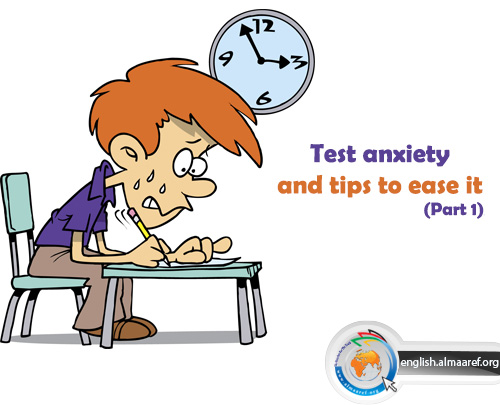Today’s the day of a big test at school, and you feel awful. Your stomach hurts
and you have a headache. Maybe your muscles feel tense and you feel shaky or
sweaty. You know you haven’t been bitten by the flu bug - but you may have a
case of the jitters, also known as test anxiety.
Here’s how test anxiety works. Let’s say you’re worried about your math test
because you didn’t do so well on the last one. Or maybe you’re kind of tense
because you did great on the last one and you’re the kind of kid who likes to
get all As. When you’re feeling worried and tense, your whole body can be
affected.
Performance Anxiety
Test anxiety is actually a type of performance anxiety. Performance anxiety is
when a person feels worried about how they will perform (do on something),
especially when it’s really important.
For instance, you might feel performance anxiety when you’re trying out for the
school band or for the basketball team.
When you’re taking a test, you might feel "butterflies," a stomachache, or a
tension headache. Some people might feel shaky, sweaty, or feel their heart
beating quickly as they wait for the test to be given out. A student with really
strong test anxiety may even feel like he or she might pass out or throw up.
Sound familiar? You’re not alone. Ask other people and you’ll find that just
about all people - adults and other kids - feel some anxiety before a test. In
fact, a small dose of anxiety can be helpful, keeping you sharp and focused. But
when your symptoms take over so that you can’t function or when you’re so
anxious that you feel sick, you might not be able to do your best.
Of course, if you didn’t study for the test, you might be worried - and for good
reason. That kind of anxiety isn’t as easy to tackle because even if you find a
way to calm down, you still might not know what the right answers are. When you
are prepared for a test and you get a handle on your anxiety, you’ll be able to
let your knowledge shine and score a good grade.
No More Tests?
If teachers know that students get stressed out about tests, why do they still
give them? Believe it or not, both teachers and students benefit from tests.
Tests measure how well students are learning the skills and information their
teachers have been teaching them.
And tests of all different sorts are a part of life - from the driving test
you’ll take one day to the test you’ll take if you decide you want to be a
doctor.
* Source: kidshealth.org




















